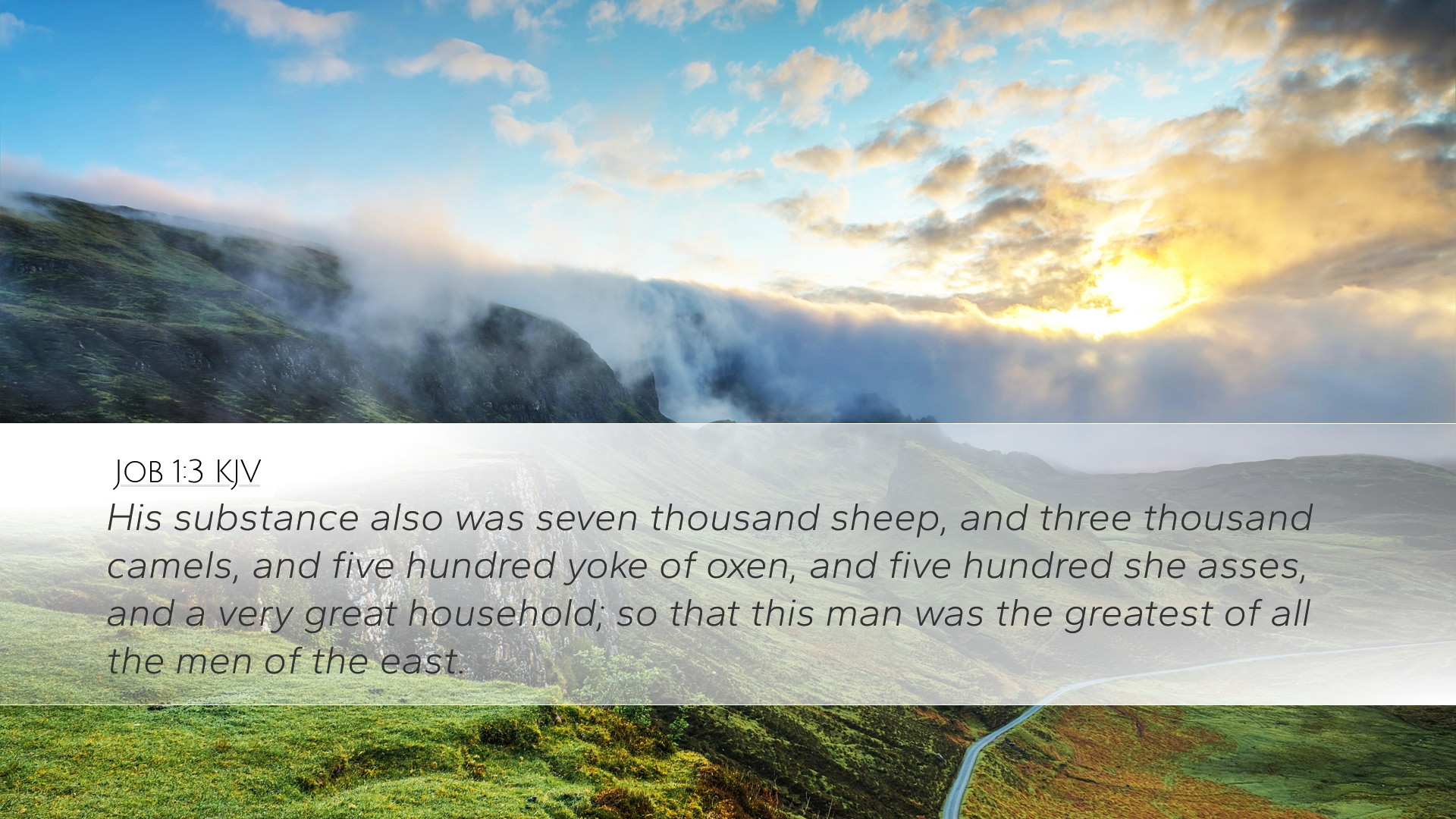Old Testament
Genesis Exodus Leviticus Numbers Deuteronomy Joshua Judges Ruth 1 Samuel 2 Samuel 1 Kings 2 Kings 1 Chronicles 2 Chronicles Ezra Nehemiah Esther Job Psalms Proverbs Ecclesiastes Song of Solomon Isaiah Jeremiah Lamentations Ezekiel Daniel Hosea Joel Amos Obadiah Jonah Micah Nahum Habakkuk Zephaniah Haggai Zechariah MalachiJob 1:3
Job 1:3 KJV
His substance also was seven thousand sheep, and three thousand camels, and five hundred yoke of oxen, and five hundred she asses, and a very great household; so that this man was the greatest of all the men of the east.
Job 1:3 Bible Commentary
Commentary on Job 1:3
Verse: Job 1:3 - "His substance also was seven thousand sheep, and three thousand camels, and five hundred yoke of oxen, and five hundred she asses, and a very great household; so that this man was the greatest of all the men of the east."
Introduction
The Book of Job stands as one of the most profound texts in Scripture, communicating deep theological themes of suffering, divine justice, and human righteousness. Job 1:3 serves as an essential introduction to Job himself, establishing his character, wealth, and status, which frame the subsequent narrative of his trials.
The Character and Wealth of Job
Job is introduced as a man of considerable means and influence in his society. The specifics of his wealth, numbering his livestock and household, indicate not just material abundance but also a sense of social standing. The number of sheep (7,000), camels (3,000), oxen (500), and donkeys (500) illustrates great prosperity.
- Sheep: The abundance of sheep suggests a focus on agricultural wealth. In biblical times, sheep were essential not only for food but also for economic transactions and religious sacrifices.
- Camels: Camels are often viewed as a valuable means of transport and trade, emphasizing Job's far-reaching influence and engagement in commerce, especially with neighboring nations.
- Oxen: The presence of oxen points to agricultural productivity, as they were necessary for plowing and farming—serving as a testimony to Job’s industriousness.
- Donkeys: Employment of donkeys further highlights Job’s pastoral lifestyle and the sustaining of a vast household.
The Significance of Job's Great Household
The text notes that Job had a “very great household,” indicating not only a large family but possibly many servants and workers under his employment. This remark speaks to Job's position of authority and the high regard in which he was held in the community. A large household often implies responsibilities that require wisdom and governance, suggesting Job was not only wealthy but also wise and stable in his management.
Job's Reputation
Matthew Henry points out that Job was “the greatest of all the men of the east.” This designation underscores Job’s standing not just in terms of wealth, but morality and righteousness. He was recognized for his piety, and his reputation would carry weight in the dialogues that follow regarding suffering, justice, and faithfulness to God.
Albert Barnes correlates Job's esteemed status to his unwavering religious commitment, positing that such integrity garnered respect even among those who may not have held the same faith. In this light, Job serves as a model of virtue, exhibiting traits that would challenge conventional notions of divine justice, particularly when calamity befalls him.
Theological Implications
Within Job 1:3 lies a profound irony that becomes evident as the narrative progresses. Job's immense blessings serve as a prelude to severe suffering, presenting teachers and theologians with a framework to explore the mystery of divine providence. Adam Clarke indicates that God’s allowance of suffering to the righteous raises inquiries that delve into the nature of faith—its permanence amidst trials and its risks of doubt when faced with unfathomable loss.
This verse sets the stage for a central question in theology: Why do the righteous suffer? Scholars argue that Job’s initial prosperity juxtaposed against his later trials invites readers to engage deeply with the themes of integrity, faithfulness, and God's sovereignty.
Conclusion
In summary, Job 1:3 not only introduces a character of immense wealth and godly reputation but also encases a theological paradox that resonates throughout the scriptural narrative. It offers pastors and theologians crucial insights into the human condition, the nature of suffering, and God's ultimate authority. Understanding Job's wealth and suffering invites deep reflection on our own lives, prompting a call to faithfulness that may withstand trials.
Engaging with the commentaries of Matthew Henry, Albert Barnes, and Adam Clarke, we are reminded of the complexities of divine justice and human experiences of affliction. Job's story is timeless, urging believers to find resilience and hope amid life's uncertainties.


